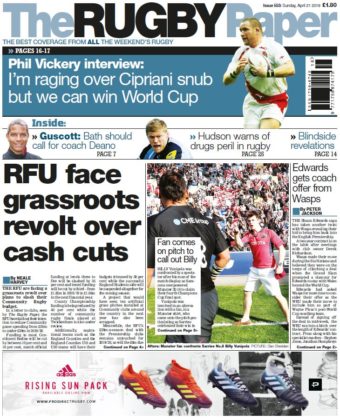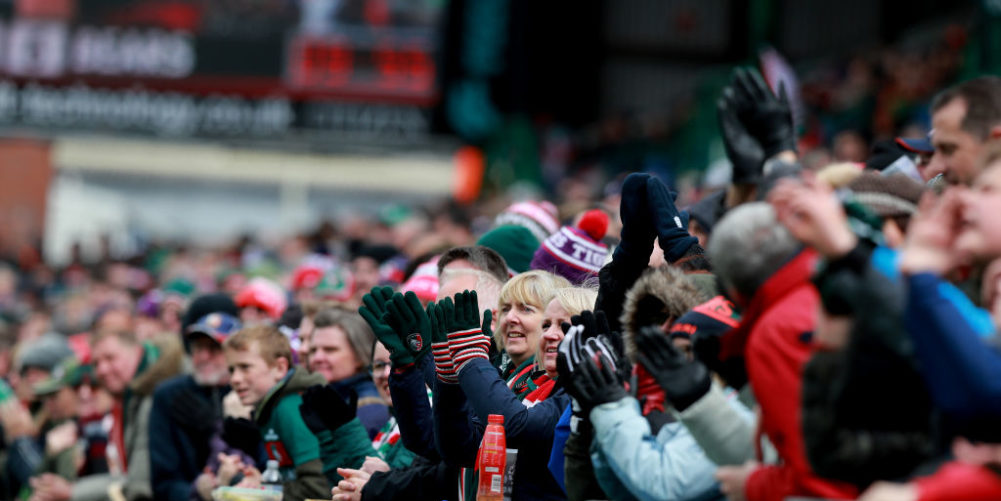Last week's front page outlining the RFU's plans to cut funds to the grassroots of the game should come as no surprise to anyone who has followed the history of the game since the dawn of professionalism.
I cannot count the number of times that I have foretold that this was an inevitable consequence of the way the RFU deal with both sections of the game, amateur and professional.
All the professional funding agreements are backed by legally binding contracts, whereas the amateur game has only a promise, or should I say, a wish and a prayer, to rely on.
When all is good in the game and finances are flush, the community game gets its equal share but as soon as things become a little tighter, or an employee of the union signs a deal that ultimately promises too much money to the Premiership and shortly after they become his new employers, it's the grassroots that have to pay.
Speaking of conflict of interest, how Mark McCafferty can step down from the Premiership to work for CVC, a company whose sole intention is to take money out of the sport and yet remain on the RFU's Professional Game Board (PGB) is beyond me.
The people I feel sorry for are the members of the RFU council who will be called upon by their constituent bodies and member clubs to explain how they let this happen. Unfortunately, they would not have had any say in what was agreed with the Premiership, as they are now restricted to dealing only with the policies of the union not the business – and anything appertaining to money is considered the business.
The business of the union is dealt with by the PGB with very little recourse to the RFU council and yet it will be the council who will be blamed by the game.
The loss of a third of the travel funding budget – dropping from £1.55m to £1.05m – will be the biggest burden felt by clubs, particularly those in the National Leagues, and those in the northern leagues that have to travel long distances to fulfil league commitments.
The breakaway by some of the teams in the Lancaster League increased the distances that many of the remaining clubs, and many in the Cumbrian League have to travel, increasing the financial pressure on those clubs to complete their fixtures.
It could encourage more clubs to leave the official league structure to revert back to local merit table style leagues of the past. This might be something that would benefit the Premiership as it would leave only those teams happy to be dual contract player nurseries, and those with real potential and the money to compete for a place in the Premiership.

In the same edition last Sunday, Exeter owner Tony Rowe extolled the virtues of the Premiership owners even though he is the only one who manages to run his club at a profit.
He is right to say they have paid a lot of money to keep the Premiership in its current form alive and that it is expensive to fund, maintain and improve the current standards, which is why the Premiership need more money.
He says the CVC investment will give the Premiership greater value and improve the balance sheets and help fund improvements in facilities, but the truth is not so clear cut.
What's obvious is that CVC did not invest in the Premiership for the love of the game of rugby, they will want a return on their investment, which in the short term will mean bigger losses for the clubs.
The value of the Premiership was estimated by CVC at around an average of £62m for each of the 13 shareholders which may sound a lot until you compare it to football where the average Premier League club is worth £791m, almost as much as the entire rugby Premiership.
What this shows is the relative size of the sport and that rugby has a long way to go before its clubs make the sort of profits that CVC hope to share without asset stripping the rest of the game.
It also begs the question can English rugby afford to pay for its Premiership at the levels it currently does?
If the owners had not stepped in to provide an artificial level of funding, clubs would have had to live within their collective means which would have seen a very different professional game. But they did.
From the day that Sir John Hall bought Newcastle, ignoring the RFU one-year moratorium on professionalism, the RFU were on the back foot.
When negotiations began with the clubs, they had already signed the players, putting the RFU at a disadvantage particularly as the union's negotiator, Fran Cotton, was a club director.
By the end of the negotiations, elite rugby as we knew it was gone forever; no Divisional rugby, no senior elite County rugby. The Premiership superceded the whole pyramid supporting the international game with agreements giving them control over where players could be selected from – at a price.
Controlling the players has given the Premiership the power to alter how the RFU had been run for the previous hundred years and coupled with changing standards of governance took financial control away from the council.
Ultimately, the council or the grassroots clubs could call a special general meeting and chance a vote but the repercussions could be more destructive than the current funding crisis.
In answer to my question can English rugby afford to pay for its Premiership at the levels it currently does?
Definitely not, if it threatens to destroy the game below.
JEFF PROBYN / Photo: Getty Images


























